If you’re looking to become a producer, many different responsibilities come with this position.
Producer duties and responsibilities can be broken down into three main categories: organizational, creative, and administrative.
For those who are new to the world of producing, or for those interested in becoming a producer, this article will provide an overview of what producers do and their responsibilities.
WHAT DOES A PRODUCER DO
What Does a Producer Do?
A producer is a person who oversees the development of a TV show, movie, or another form of media.
Producers work with writers to shape scripts, cast actors and actresses for roles, and make decisions about how much money will be spent on-location filming.
Producers are also responsible for advertising their product in order to attract people to watch it.
Ever wondered who’s the mastermind orchestrating the magic behind your favorite movies, TV shows, and albums?
That’s the producer’s realm, where creativity meets logistics.
In this article, we’ll jump into the multifaceted role of a producer, unraveling how they’re pivotal in transforming concepts into consumable art.
From securing funding to overseeing the final cut, producers wear many hats.
We’ll explore the nuances of their day-to-day responsibilities and the skills that set successful producers apart.
Stick with us as we reveal the ins and outs of a producer’s world, showcasing why they’re often considered the unsung heroes of entertainment.
The Role Of A Producer
Stepping onto a film set, one immediately senses the organized chaos that brings a story to life.
At the helm of this creative maelstrom is the producer – a role that demands a multifaceted skill set and unwavering dedication to the cinematic vision.
A producer’s influence spans the entirety of a film project, often times beginning with the seed of an idea.
From the spark of inception, a producer nurtures this concept, securing the necessary resources – financial, human, and material – to transform it into a visual reality.
The duties of a producer can be broken down into several key areas:
- Development of the project – Pre-production arrangements,
- On-set management and problem-solving – Post-production oversight – Marketing and distribution strategy.
Each of these domains calls for a unique mix of creativity, managerial acumen, and industry savvy.
Producers must deftly juggle these responsibilities while maintaining a clear channel of communication with all parties involved.
In the development phase, producers are tasked with fine-tuning the screenplay, attaching talent, and plotting out the logistical framework.
They’re the force that galvanizes a project from concept to concrete plan.
Once in pre-production, the emphasis shifts to scheduling, budgeting, and assembling a team that shares the producer’s passion and commitment to the film.
Even the most meticulously planned schedules can encounter unexpected obstacles, and it’s up to the producer to navigate these challenges with astute decisiveness.
On the ground during filming, producers are the nexus of activity, ensuring that each day’s shoot aligns with the project’s broader timeline and budget constraints.
Their foresight is essential in anticipating and mitigating on-set difficulties before they escalate.
As the film takes shape in post-production, the producer’s role becomes that of a vigilant overseer.
They collaborate with editors, sound engineers, and composers to polish the raw footage into a coherent and impactful narrative.
Simultaneously, a producer’s focus is on shaping the marketing approach, organizing film festival appearances, and devising a strategy for distribution that maximizes exposure and revenue potential.
Indeed, the producer’s journey with a film extends well beyond the wrap party.
Our understanding of these roles emphasizes the importance of recognising the producer as an indispensable figure within the entertainment industry, poised at the intersection of art and commerce.
Responsibilities Of A Producer
When diving into the myriad duties that fall under a producer’s purview, Development stands out as a cornerstone.
In this phase, we engage in sourcing and selecting promising scripts or concepts.
This means meeting with writers, assessing drafts, and choosing the most compelling stories.
Pre-Production calls for meticulous planning.
We’re tasked with forming a robust production team, securing the necessary funding, and setting budgets.
This stage is fundamental in establishing the groundwork for smooth operations throughout the filming process.
During Production, we oversee the day-to-day shoot.
This involves ensuring that schedules are met and the project remains on budget.
It’s our job to address issues as they arise and keep the team motivated, ensuring that creative vision translates on screen.
In Post-Production, attention shifts to the editing room.
We supervise the editing process, visual effects, music composition, and sound design.
Our involvement is critical to shaping the film’s final form.
Marketing and Distribution are also key features of our role.
We collaborate with marketing teams to create compelling promotional material.
Our goal is to maximize the project’s reach by devising strategies for its release in various formats and platforms.
Here’s what we also cover:
- Navigating Festivals and Distribution Deals – forging connections that can catapult a project into the limelight.
- Securing a Return on Investment – analyzing markets and audience trends to ensure the film’s financial success.
- Building a Lasting Brand – positioning both the film and ourselves within the entertainment industry for future opportunities.
Our role doesn’t end with the film’s release.
We continuously monitor audience reactions and box office performance.
We gauge the success of the project and learn from audience feedback which, in turn, informs our future endeavors.
Securing Funding And Budgeting
Securing the capital to fund a film project is among the most crucial steps a producer undertakes.
We must tap into various sources – private investors, studio contributions, or grants – to gather the necessary financial support.
Once funding is secure, we embark on the meticulous process of budgeting.
Every dollar counts, and precise allocation is non-negotiable for a film’s success.
We navigate through complex financial landscapes to ensure the film’s viability.
Government incentives, tax credits, and pre-sales to distributors are often explored to bolster a film’s budget.
The screenplay, expected running time, and talents involved heavily influence the overall budget.
We negotiate deals and liaise with agents to secure the best possible talent within our financial constraints.
Crafting a detailed budget is a balancing act.
We must prioritize essential elements while leaving room for unexpected expenses.
Principal photography, actor salaries, set design, and post-production are large pieces of the budget pie.
We often work with line producers or production managers who specialize in crunching numbers and ensuring that we stay on track financially.
The success of past projects greatly affects our ability to secure funding for new ventures.
Hits like Titanic or The Lord of the Rings series have made it easier for producers involved in those films to go on to work on other high-profile projects.
Track records matter, and each successful film adds to our credibility in the industry.
We’re constantly learning and adapting to the ever-evolving financial aspects of filmmaking.
Staying abreast of industry trends, funding opportunities, and cost-saving technologies is part of our ongoing commitment to the craft.
In the high-stakes game of filmmaking, prudent funding and budgeting aren’t just best practices – they’re essential for our survival and success.
Creative Collaboration And Project Management
It’s essential to recognize that producing a film involves significant collaboration with creative talents to bring a vision to life.
Our role reaches beyond mere project management; we actively engage with directors, writers, and the entire creative team to ensure the film’s vision is coherent and captivating.
We’re not just project managers; we’re the adhesive that binds the various departments together.
Throughout the production process, we Help smooth communication, resolve conflicts, and maintain a balance between creative desires and practical constraints.
Let’s jump into key collaborative efforts we undertake:
- Guiding the creative direction with the director and head writers,
- Discussing character development and plot progression,
- Liaising between the creative team and the production crew to make sure everyone’s on the same page.
Regular check-ins with department heads are vital to keep the project on track.
We ensure costume, set design, and visual effects departments align their work with the director’s vision, tweaking as necessary for consistency.
In project management, we’re continually juggling timelines and resources.
Our duties are to:
- Map out schedules and deadlines,
- Monitor progress to avoid any potential delays,
- Allocate the budget across departments effectively.
Time is money, and we’re adept at ensuring neither is wasted.
The successful execution of a film project depends on our leadership and organizational skills, complemented by our passion for storytelling.
Harnessing the latest in digital tools allows for a streamlined workflow.
Production management software, cloud-based collaboration platforms, and real-time communication apps are among the tools we use to keep everyone connected and informed.
We also keep a keen eye on the daily rushes to gauge if the film’s quality meets our expectations and standards.
Providing feedback to the directors and crews, we shape the raw material into the envisioned cinematic experience.
Overseeing The Production Process
Effective oversight often separates a successful production from a failed one.
As producers, we are deeply immersed in the production process from start to finish.
Ensuring the film progresses smoothly requires our constant attention.
Budget oversights, scheduling conflicts, and unforeseen challenges must be swiftly addressed.
One crucial aspect is selecting the right team.
This includes not only the director and principal cast but also the hardworking crew behind the scenes.
Collaborating and maintaining morale among the team is our responsibility.
A unified crew can make even the most challenging shoots manageable.
In the digital age, we also focus on leveraging technology – tools that allow real-time collaboration and feedback are game-changers.
Software for script breakdowns, scheduling, and budget tracking are invaluable to us.
Here are just a few of the tools we rely on:
- Digital asset management systems,
- Online production calendars,
- Real-time communication platforms.
Emergency preparedness is another aspect we can’t ignore.
Back-up plans for equipment failures or location issues are critical.
Throughout the production process, we’re continuously assessing the quality of the footage.
We’re involved in everything from camera angles to lighting setups to ensure the final product meets our high standards.
Attention to detail is what allows us to catch potential problems before they become actual issues.
Monitoring daily rushes, providing timely feedback, and keeping a close eye on the production schedule are all in a day’s work.
Our goal is always clear – to Help the creation of compelling stories while managing the logistical ballet that is film production.
Balancing creative vision with practical execution is an art form in itself, one that we’re always striving to perfect.
Communication And Negotiation Skills
As producers, we wear numerous hats, and one of the most crucial is that of the communicator and negotiator.
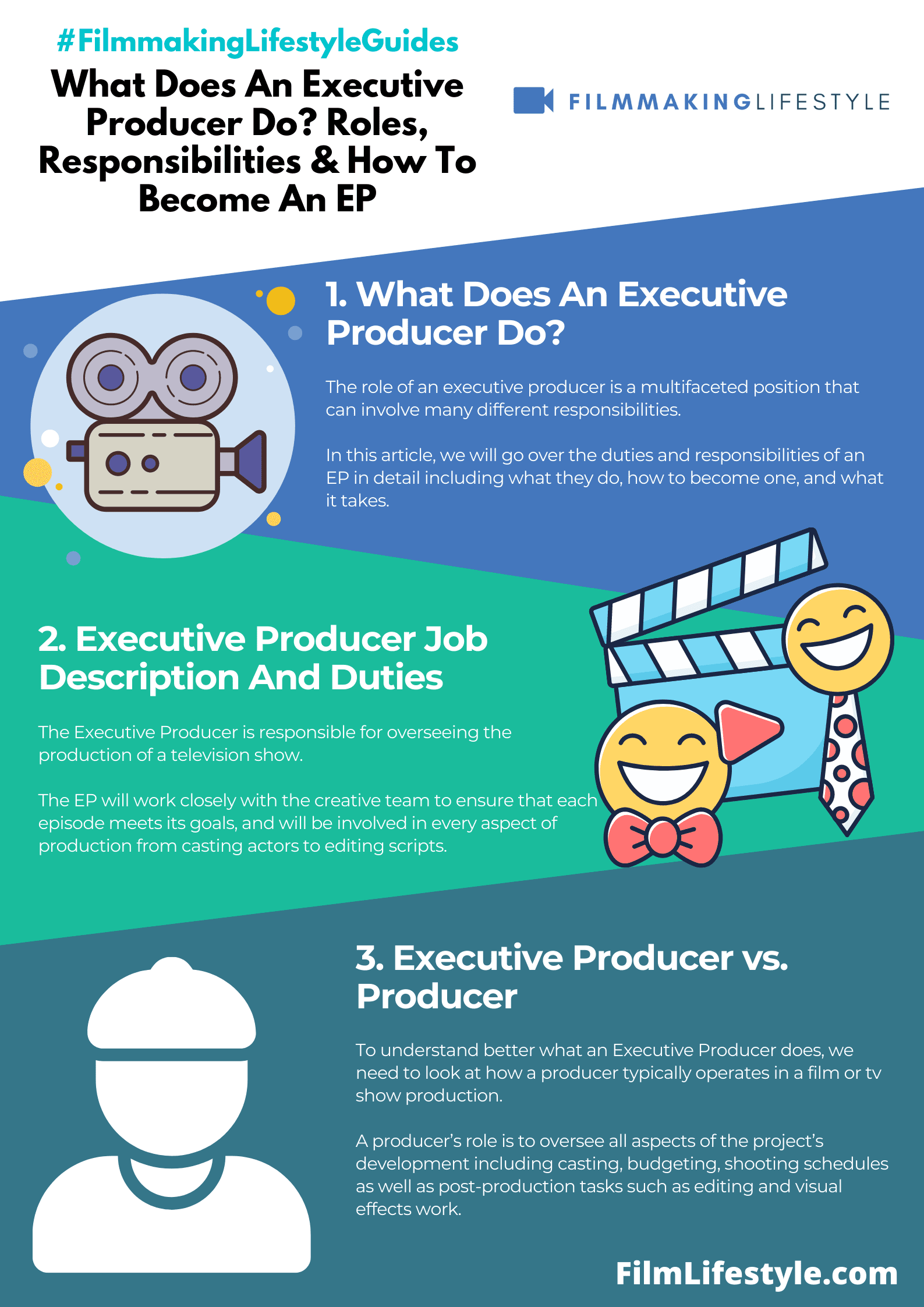
Tasked with being the hub of the project, we ensure that ideas are articulated clearly and decisions are made effectively.
Our role involves constant dialogue with directors, writers, and the production crew.
We bridge the creative and practical aspects of filmmaking, translating between different departments to foster a cohesive production environment.
Negotiation is another key area where we excel.
Whether it’s securing rights to a screenplay or negotiating contracts with cast and crew, our ability to confidently navigate discussions is
We leverage our industry know-how to strike deals that benefit both the production and the parties involved.
Here are a few aspects where our communication and negotiation prowess comes into play – – Securing locations and equipment at the best rates
- Settling creative disputes with diplomacy,
- Balancing the demands of investors with the vision of our creatives.
When handling sensitive negotiations, we maintain a level of discretion and tact.
We understand the importance of building long-term relationships within the industry.
Our communication must always be clear, transparent, and respectful, ensuring that we mitigate misunderstandings before they escalate.
In the world of filmmaking, where things can change in a split second, our ability to convey messages swiftly is indispensable.
finally, emotional intelligence plays a major role in our daily interactions.
We are adept at reading the room, adapting our approach to suit the dynamics of each conversation.
It’s our firm belief that the right words can open doors and create opportunities that lead to a successful production.
The Unsung Heroes Of Entertainment – Why Producers Matter
Producers are the pivotal cogs in the entertainment industry machine.
Their expansive role often goes unnoticed by the audience, yet they are instrumental in transforming creative visions into tangible entertainment.
Behind every successful film is a producer who’s navigated the treacherous waters of show business.
They balance the art of storytelling with the science of budget management to ensure that projects like Star Wars or Casablanca not only see the light of day but become iconic.
Producers are akin to architects of the film’s infrastructure.
Our role encompasses the meticulous orchestration of various elements:
- Ensuring the script aligns with the director’s vision,
- Casting the right talents for on-screen magic,
- Juggling the financial aspects to maximize the production value.
Our skill set extends beyond the logistics.
We foster environments where creativity thrives and where each team member can perform at their best.
Effective communication is our hallmark.
We must crystalize abstract ideas into actionable plans, ensuring that everyone from the lighting technicians to the lead actors understands their role in the larger narrative.
Mastering the art of negotiation is part of our daily routine.
We’re in constant dialogue with studios, distributors, and agents to strike deals that benefit all parties involved and ensure a project’s completion.
In the realm of entertainment, emotional intelligence is our secret weapon.
Empathy and understanding steer us through the complex social dynamics on set, allowing us to resolve conflicts and inspire teams.
Being at the helm of a production, we also navigate the shifting tides of public preference and market trends.
It’s our business to anticipate what viewers want, even before they know it themselves.
Our influence extends well beyond the closing credits.
The final product might bear the director’s name, but the journey from script to screen is ours to champion.
We are the unsung heroes, and our expertise is what makes memorable stories come alive for audiences around the world.
What Does A Producer Do – Wrap Up
We’ve seen that producers are the linchpins of the entertainment industry, expertly weaving together the intricate tapestry of filmmaking.
They’re not just overseers; they’re the driving force behind the scenes, turning creative concepts into cinematic reality.
With skills that span across communication, negotiation, and emotional intelligence, producers ensure that every aspect of production aligns with the ultimate vision.
Their role is pivotal in crafting stories that resonate with audiences and stand the test of time.
It’s their unwavering commitment and multifaceted expertise that bring our favorite films and shows to life.
Frequently Asked Questions
What Are The Primary Responsibilities Of A Producer In The Entertainment Industry?
A producer guides the project’s creative direction, manages the budget, schedules, and team communication, and oversees the production process to transform a script into a visual story.
How Does A Producer Collaborate With The Creative Team?
Producers work closely with the creative team to discuss character development, plot progression, and to ensure the creative vision aligns with the production capabilities.
What Project Management Roles Does A Producer Play?
Producers are responsible for mapping out schedules, setting deadlines, monitoring project progress, and effectively allocating the production budget.
How Do Producers Use Technology In Film Production?
Producers utilize digital tools such as asset management systems, production calendars, and real-time communication platforms to streamline workflows and maintain team connectivity.
What Is The Significance Of A Producer’s Role In Daily Rushes?
Producers provide critical feedback on daily rushes to shape the raw film material in line with the envisioned cinematic experience.
In What Ways Do Producers Handle Unforeseen Production Challenges?
Producers address budget oversights, scheduling conflicts, and other challenges by having contingency plans, being detail-oriented, and continuously assessing the quality of the footage.
Why Are Communication And Negotiation Skills Vital For Producers?
Effective communication and negotiation skills enable producers to articulate ideas, make decisions, negotiate contracts, and maintain vital relationships within the industry.
How Do Producers Ensure The Film Aligns With The Director’s Vision?
Producers ensure that the script and the creative input align with the director’s vision by facilitating clear communication and collaboration between all parties involved.
What Role Do Producers Play In Casting And Fostering Creative Environments?
Producers select the right talents and foster environments where creativity thrives, ensuring that all team members contribute their best to the production.
How Do Producers Adapt To Market Trends And Public Preferences?
Producers analyze market trends and public preference shifts to anticipate viewers’ desires and to help create compelling stories that resonate with audiences.
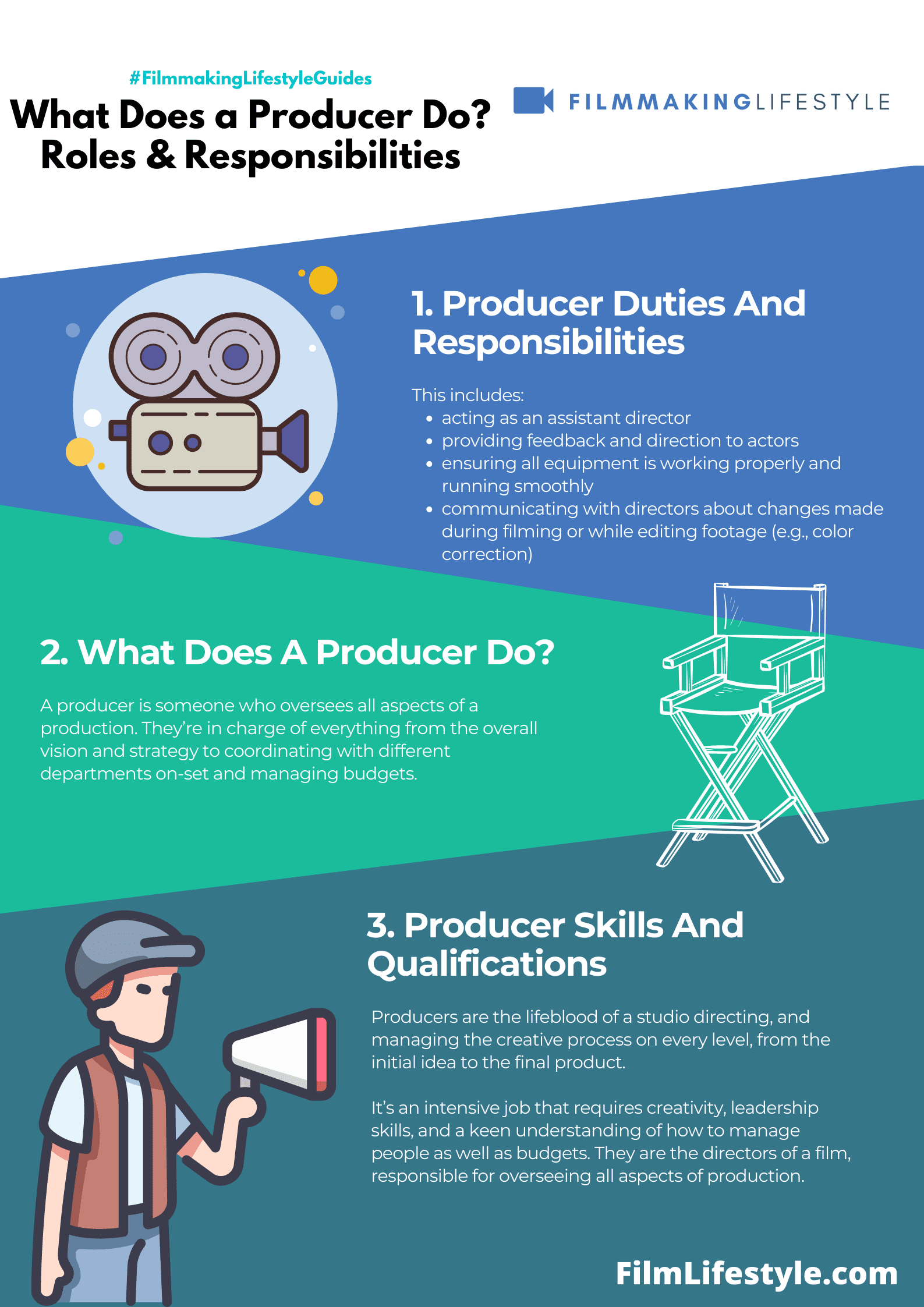
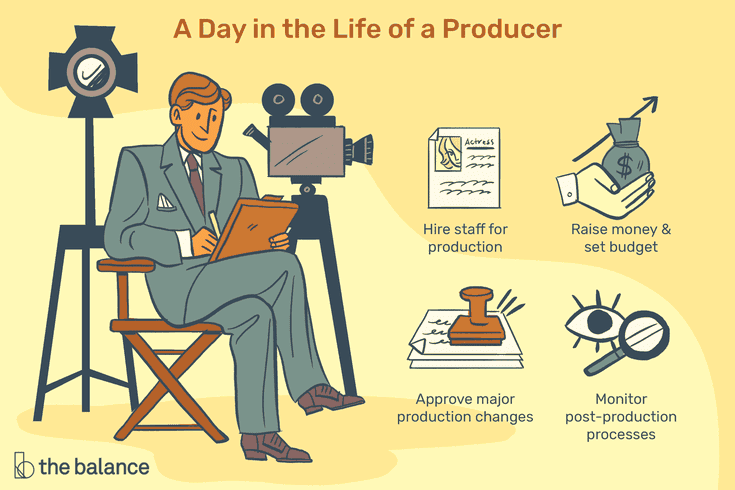
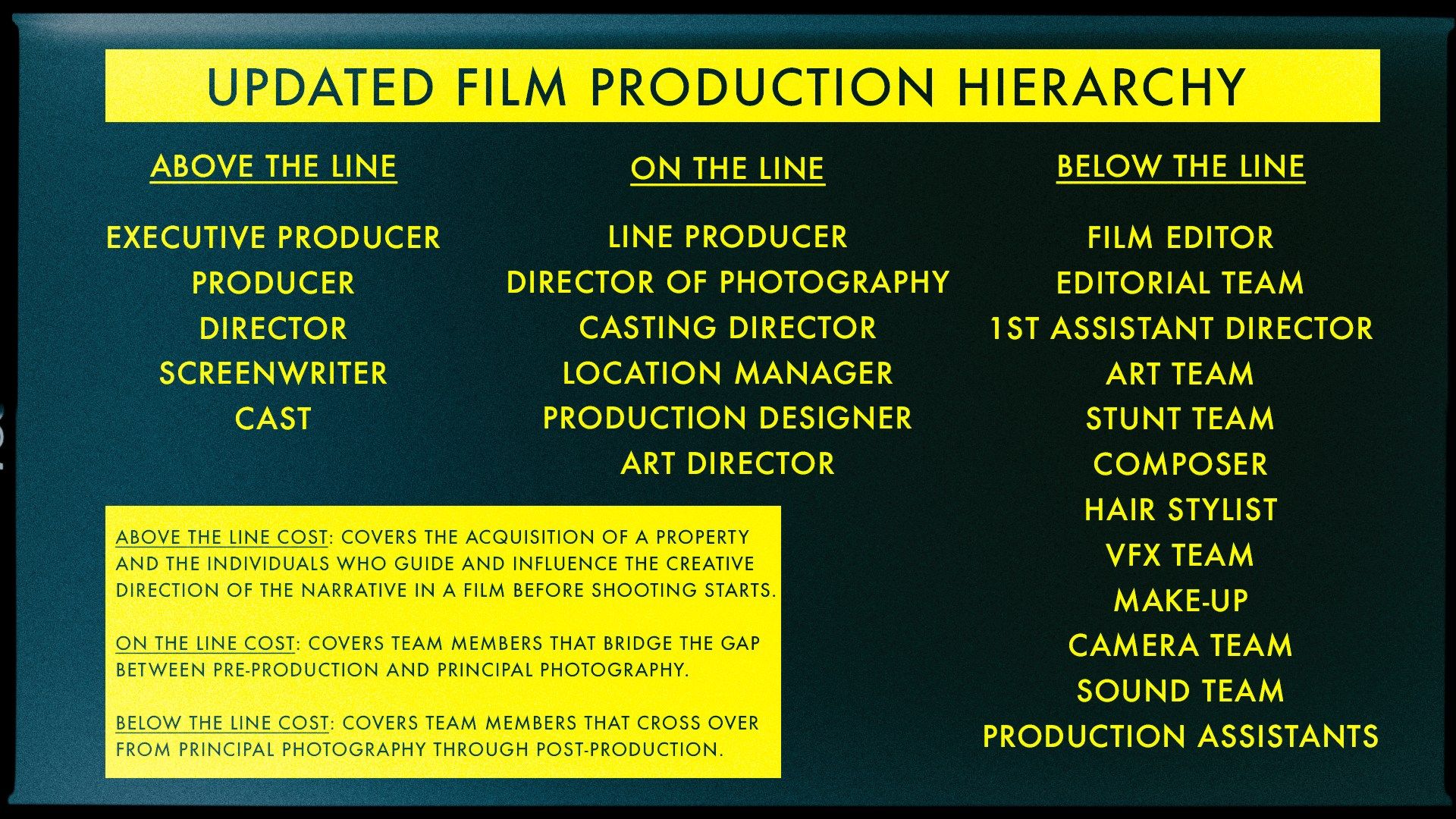
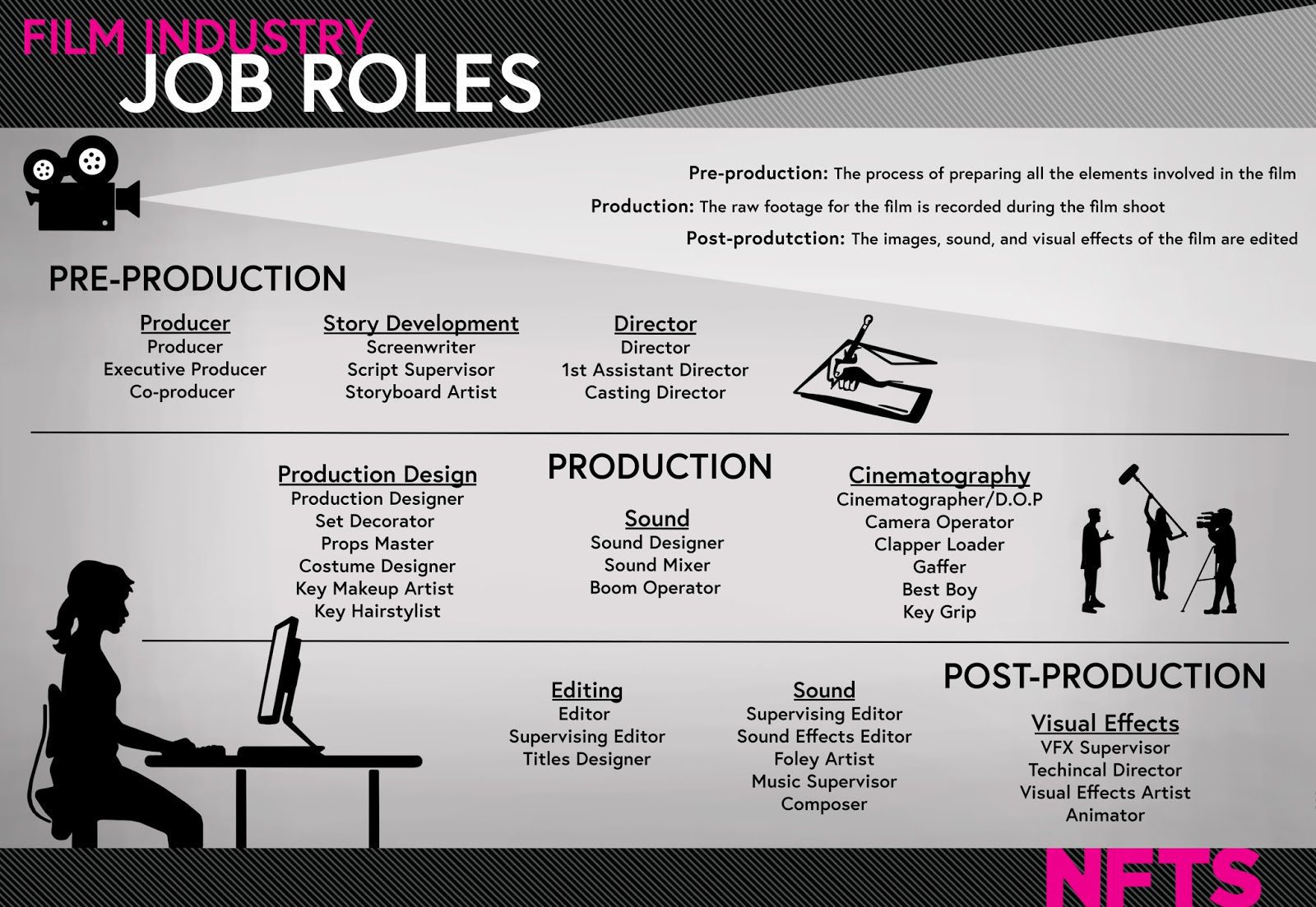

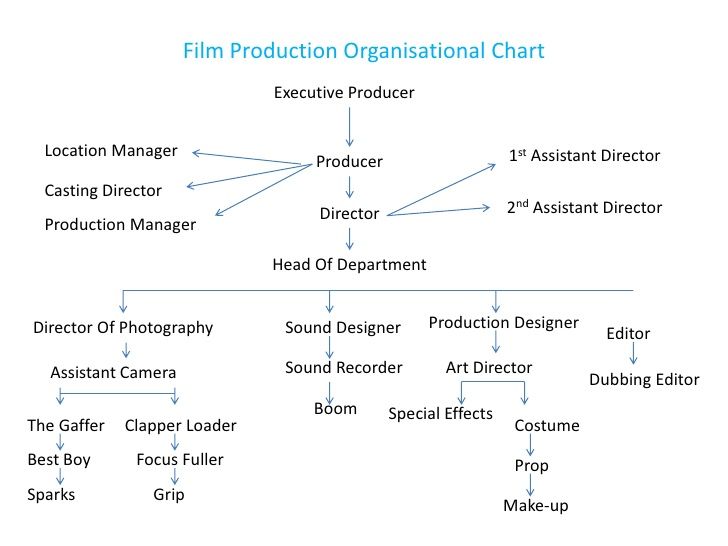
Matt Crawford
Related posts
2 Comments
Leave a Reply Cancel reply
This site uses Akismet to reduce spam. Learn how your comment data is processed.



This blog was… how do you say it? Relevant!! Finally I’ve found something that helped me. Kudos!
Understanding the roles and responsibilities of a producer is essential for anyone in the film industry.
I’ve always been curious about what a producer does. Your article has answered my questions and enlightened me about their vital role.
Thanks for the kind words, Armando. Valid points, too.